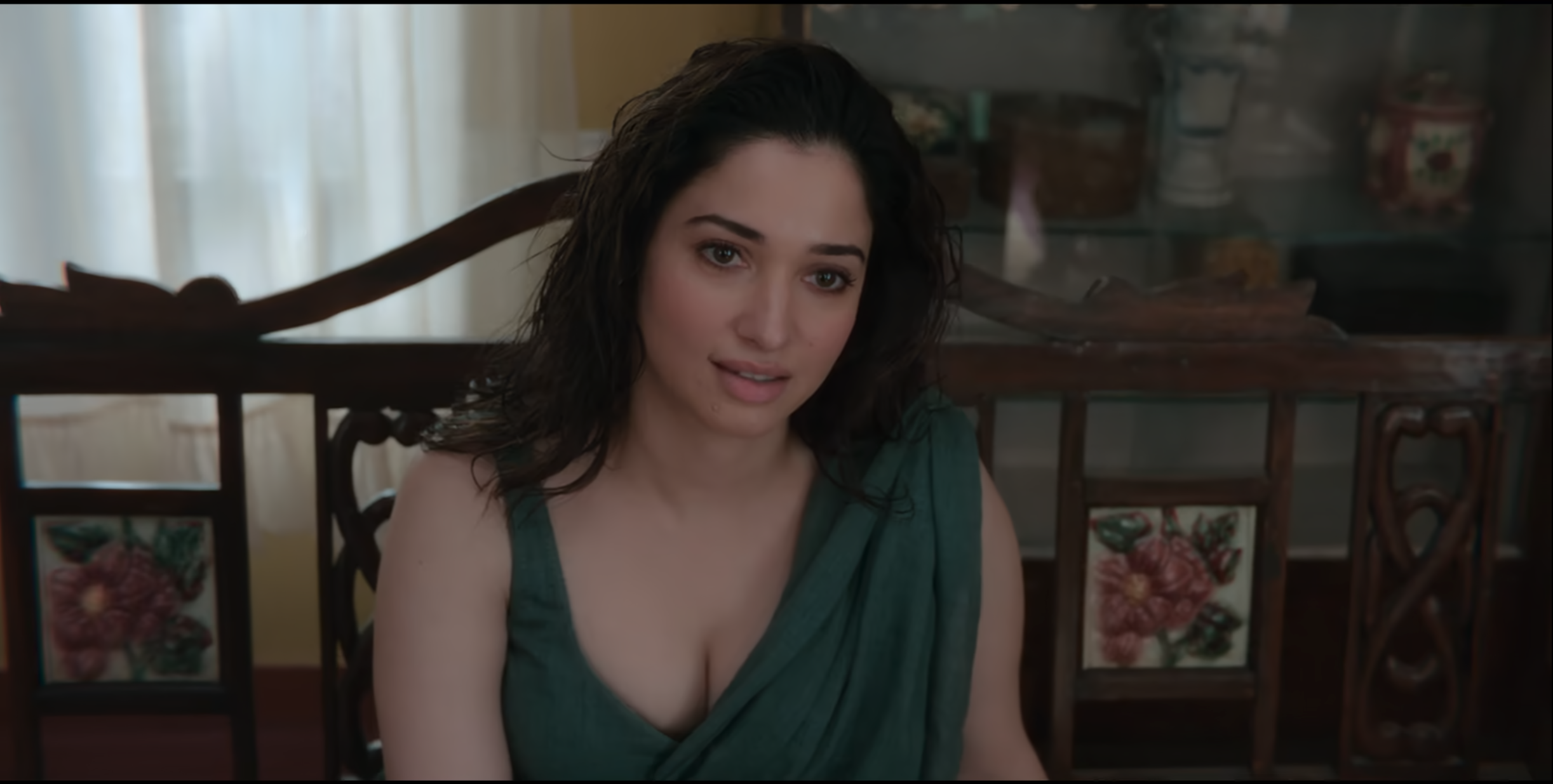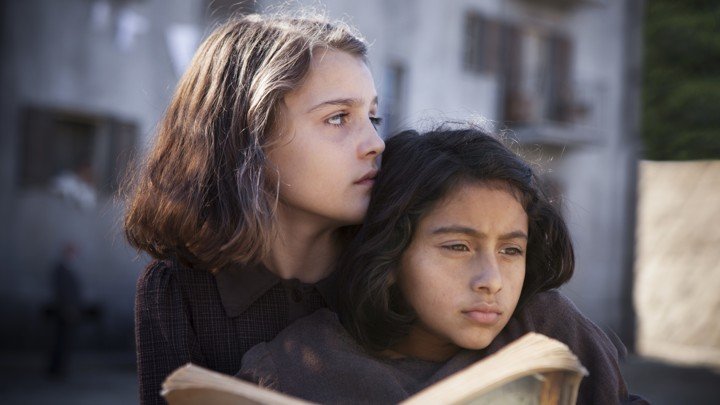Watching Lust Stories 2 is a bewildering, frustrating experience because it is frankly easy to sense that most of the commissioned filmmakers seem to have missed the memo. There is either a rigorously progressive stance championed in R. Balki’s film that quickly peters out into flat and vapid posturing or personality-free settings where Sujoy Ghosh and Amit Sharma’s films enact their bursts of excessive behavior.
The latter two films suffer from a clutch of common problems. Their paper-thin characterization relies entirely on the knowledge of an impending twist which, when it comes, oscillates between pat and contrived. Sharma uses a swell of music to bolster the end twist, as Kajol’s Chanda strides out with accomplishment and pride to witness the effects of her plotting, which would finally liberate her from routine abuse at the hands of her husband, a drunken, lecherous raja in Rajasthan played by Kumud Mishra. Sharma’s film is the one that goes back the furthest in history, unlike the others that are as contemporary as it gets.
However, the narrative’s treatment of a raja, Mehersa, who resists his palace being converted into a hotel, arrogantly vaunting his caste privileges and brutalizing his wife and maids with his relentless lechery, is tiringly dated. The wife, Chanda’s only hopes are pinned on her son to secure an education in England, which can enable her to escape from this place that has put her through more abuse than the one where she was salvaged from. The film has a peculiar listlessness to it, never quite earning its duration that seems protracted even for a short, as the screenplay retreads grounds already established by itself to unsatisfying results.
Ghosh’s film is head-scratchingly bizarre in its anxious commitment to an undertow of suspense and unpredictability that the director has now become synonymous with, albeit to a fault. Right from the moment we see the skies of Paraisol, the town where Vijay’s (Vijay Varma) car runs into an accident, there is an element of artifice force-fitted in. He stumbles across his ex-wife, Shanti, who vanished ten years ago, and the two take us through a memory lane of sorts which provides us with the template of a repressed, triangulated relationship among Vijay, Shanti, and Anita, who’s Vijay’s current wife. But the poorly done flashbacks and the mounds of reminiscence hurled our way fail to elevate these characters above being the victims and orchestrators of manipulations.
Ghosh peppers in moments of unease that Shanti projects as Vijay makes his advances, stirring doubt, and suspicion that something is not very far from imploding. This film feels like it is set in some vacuum, perhaps fittingly, with the hindsight of the twist. Still, everything from the CGI landscape to the long lovemaking scene comes across as distractingly annoying and a bit of a cheat, stripped of properly intelligent writing that can make sense of this unreliable narrative.
As twisty as Ghosh is deluded in thinking his film is, there are equal amounts of absolutely misled ideation that has bred Balki’s short. He leaves the heavy lifting entirely and expectedly to Neena Gupta, who essays a grandmother in a typically conservative household who otherwise talks so straight about sex and the need for sexual compatibility in love in front of the bridegroom’s parents that she shocks and sours the mood of the occasion. Her family, including her granddaughter, Veda ( a cringe-inducingly chirpy Mrunal Thakur), is rattled by this facet to her.
While the dadi keeps blasting her opinions on bodies being volcanoes, spewing metaphors that equate orgasm to Mount Fuji, and nonchalantly sharing details of her sex life with her deceased husband to Veda, Balki otherwise maintains a coy, family-friendly design in the film. The scandalous provocation is limited to Dadi’s chatter, which turns so bald after a point that one begins to suspect it is a mere personality filler, taped on to lend comic relief and keep the film sailing in amiable, risk-free ways.
There cannot be a shred of argument about which director in Lust Stories 2 has taken risks and demonstrated the most breathtaking daring skills. Konkona Sen Sharma’s endlessly alluring, heady film, The Mirror, hops through the most complex thematic rings with such an entrancing effortlessness that it left me in a daze and almost entirely unable to adequately even register the other three films in the anthology. It centers on the relationship between Isheeta (Tillotama Shome), a single, upscale woman with a swanky apartment in Mumbai, and her maid, Seema (Amruta Subhash) that shifts into risqué directions very early on.

Unlike the other directors, Sen Sharma and her co-writer, Pooja Tolani, refrain from the slightest measure of any pedantic impulse. These are brave storytellers who do not bashfully tiptoe in, and around the grandly messy, morally murky terrain they have set up; they dive headlong into both the implications and shockwaves that erupt after Isheeta accidentally walks in on her house help having sex on the bed in her apartment. Initially, she is flabbergasted but soon develops a peculiar appetite for voyeurism.
She begins sneaking in every day to watch, fuelling her desires. The filmmaker, however, is too smart to let this power-laden equation remain stable; she promptly problematizes it as the person being watched discovers she is being watched. The voyeur and the exhibitionist enter a knowing, unspoken agreement, each acceding to whet the other’s needs and unfulfilled desires.
For most of this film, Sen Sharma retains a razor-sharp tautness, aided by Sanyukta Kaza’s masterfully agile editing transitions and Anand Bansal’s leisurely, lush camera movements, which span a breadth of time and span with equal dexterity. Sen Sharma reckons with the unruly tangle of desire and pleasure, braiding Isheeta and Seema together in ways that are alert to the underpinnings of class dynamics. In a standout sequence, the camera gradually zooms in on Shome’s Isheeta, her face subtly reflecting flashes of new pleasures she’s encountering. It’s a terrific, layered performance that does not reveal the mechanics of character but quietly and enigmatically guards Isheeta’s fascinating essence. She stays profoundly attentive to the rhythms of her variable moods.
Sen Sharma’s perceptive eye for staging, movement, and scene blocking reaches dizzyingly brilliant heights in a sequence where Seema, after she realizes Isheeta’s surreptitious habits, strides to the room to make love to her husband while making it known to Isheeta that she knows she is being watched. Deprived of space in their tenement, Seema and her husband can only find intimacy in stolen snatches of an hour in Isheeta’s apartment.
The Mirror is a bracingly subtle comment on womanhood and loneliness in cities, the screenplay knitting in Isheeta’s complex motivations with an ever-so-wondrous lightness of touch. With Bansal’s exquisite lighting, Isheeta’s profound isolation hits several plangent notes, handled in Sen Sharma’s characteristic skill for the economy.
Tillotama Shome and Amruta Subhash put up a thrilling, tantalizing tease with their performances that are canny and respectful, wilfully transgressive, and utterly wild. These are actors who beguile us by expanding furthermore the rich ambiguities that each look and exchange in this film is loaded with. Power keeps shifting in the tussle between the observer and the observed, both Isheeta and Seema wrestling for control in mute negotiations. We, the viewer, are also implicated.
The scene where the pact comes undone as things blow up when Seema’s husband, who was a stranger to this negotiation, chances upon Ishita’s clandestine viewings, unmasks the shame, disgust, and guilt interlaced with class locations and the desires of single women straining to find a vent. Shome and Subhash maneuver the emotions through an anxious, desperately high-pitched, feral confrontation scene and their characters’ repressed yearnings, folding upon one another with astonishing elegance and restraint.
The actors nudge and poke at the boundaries of judgment, rendering a delicate, nuanced, and playful frisson of tension as their characters step across all supposed lines of conduct. With The Mirror, Konkona Sen Sharma stakes for and cements her reputation as being one of our most staggeringly visionary storytellers, consistently enlarging the arena for empathetic, inclusive, and charming provocation.



![Prime Time [2021] Review – Empty hostage thriller features another great Bartosz Bielenia performance](https://79468c92.delivery.rocketcdn.me/wp-content/uploads/2021/04/Prime-Time-2-highonfilms-768x432.jpg)




